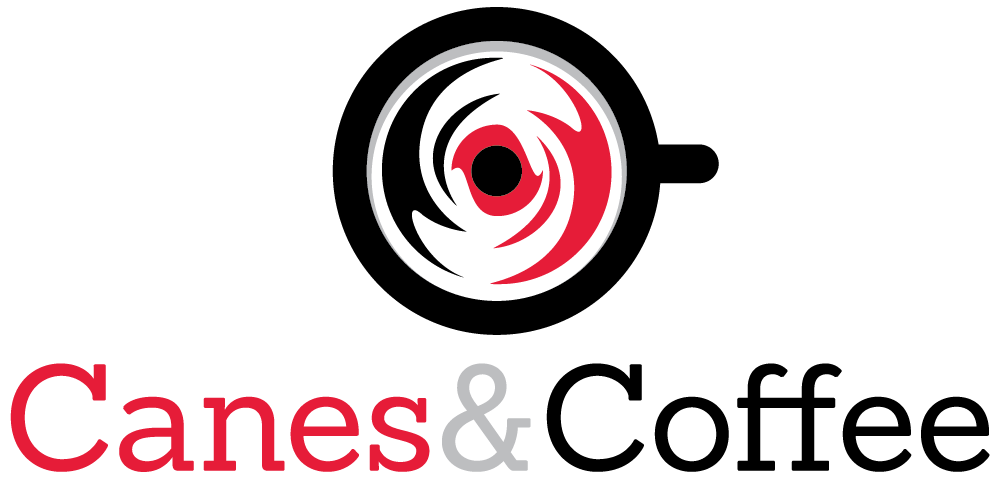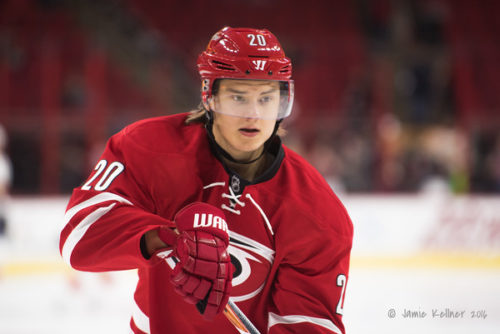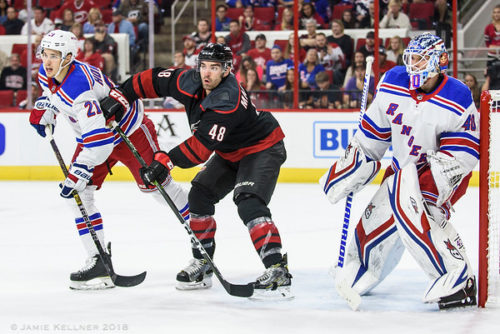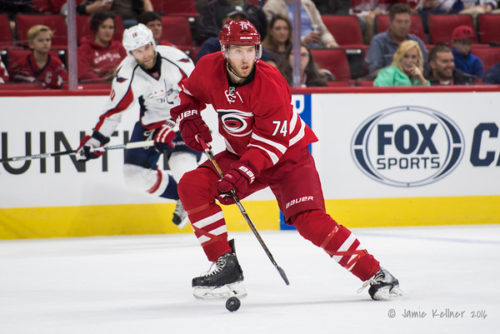In today’s NHL, one key skill set for general managers is being able to creatively maneuver around the salary cap. When with the Lightning, Steve Yzerman was like Houdini being able to somehow get out of bad contracts to always make the salary cap math work. Another option is to pay dearly to unload bad contracts to free up cap space. The Hurricanes obtained Teuvo Teravainen for taking on Bryan Bickell’s salary when the Blackhawks were in a tight spot. And more recently, the Hurricanes obtained a first-round draft pick for taking on Patrick Marleau’s salary and buying him out. While pulling an occasional Houdini on a bad contract or paying a price to unload one present options for salary cap management, the better way is having a proactive plan. Today’s Daily Cup of Joe looks at how the Carolina Hurricanes’ cap situation schedules out over the next couple years.
2019-20 Carolina Hurricanes
If one backs out the salaries of Clark Bishop and Brian Gibbons assuming that both players can be sent to the AHL if necessary, the Hurricanes currently have $3.9 million of cap space remaining. That should be roughly what is needed to re-sign Justin Williams if he decides to return. If Williams returns and ideally signs a contract with part of his pay performance-based, the Hurricanes will not have a ton of flexibility but will have done well trying to increase depth and fill some gaps.
2020-21 Carolina Hurricanes
Based on pushing up again the salary cap for the 2019-20 season, one might assume that the Hurricanes will have a tough time making the math work again for the 2020-21 season. But digging a bit deeper into the numbers shows the Hurricanes to have a good amount of flexibility for next summer. Marleau’s cap hit comes off the books and quickly frees up $6.25 million. Justin Faulk ($4.8M), Trevor van Riemsdyk ($2.3M) and Erik Haula ($2.8M) also have expiring contracts. The result is about $16 million of cap space (assuming no increase in the salary cap) to re-sign or replace only three players and if necessary cover raises for restricted free agents Haydn Fleury, Lucas Wallmark and Warren Foegele. The amount of money available will provide significant flexibility to re-sign Faulk at a higher salary if necessary and/or add a couple higher-cost players to fill gaps or replace departing players.
2021-22 Carolina Hurricanes
The off-season before the 2021-22 season that follows will see the Hurricanes needing to re-sign Andrei Svechnikov. That contract will require a significant raise over his current sub $1 million entry-level contract. The team will also need to re-sign or replace Dougie Hamilton and also forwards Ryan Dzingel, Jordan Martinook and Brock McGinn. Best bet is that the Hurricanes will have some cap space in reserve coming out of the 2020-21 season, but the team will also free up additional cap space with Alexander Semin and his $2.3 million cap hit coming off the books and James Reimer’s $3.4 million also coming off the books. Just like with the year prior, the Hurricanes will free up a good chunk of salary, $5.7 million in this case, without really creating a hole that needs to be filled.
What say you Canes fans?
1) When you look out a couple years, what do you see as the Hurricanes biggest challenge in terms of continuing to improve but also staying under the salary cap?
2) What do you anticipate for next contracts (if they re-sign) for Justin Faulk, Andrei Svechnikov and Dougie Hamilton?
Go Canes!




1. I am not really seeing challenges in how Waddell managing the cap over the next two years (maybe I am missing something??). I really like our cost certainty for our core pieces (Aho, Turbo, Staal, Nino, Slavin, Pesce). We have players coming who may well challenge for depth roles in a couple of years which will keep salary inflation down. We have a lot of 1- and 2-year contracts for vets. And we have significant cap coming off in the next year or two. What’s not to like??
I think the real issue the impact of a Faulk extension (see below).
2. Way too early to guess on Svech. For me the big question is how much more do we pay Faulk than we are currently paying Slavin and Pesce? Is he really worth $2M/yr with term? That creates a cap issue in the future, as soon as 2020-21, perhaps, but more likely out-years from there. To me, it may well be a decision between Hamilton and Faulk, particularly if Bean steps up.
I agree you have identified a couple of good questions. As time passes from season to season managing the payroll becomes more and more difficult for the GM’s.
From my viewpoint the critical issue isn’t the salary cap, it’s the actual salary budget. Assuming on ice performance improves, bottom line financial performance will need to improve as well, especially in year 3 of new ownership. While it has been predicted that next year’s cap increase will be small again, the rise in the following season could be major due to the effect of a new national (USA) tv contract. The question becomes, as the team has to compete salary wise to retain and obtain established players, will they be able to run with the big dogs?
Agood point and certainly something to keep an eye on.
The deals for Slavin and Pesce are key, thanks RF. And Wadell turned RF’s Rask mistake into Nino. Aho and TT signed team friendly deals, IMO. This all leaves the Canes in a good salary cap position.
Hopefully there will be cap challenges as our players perform well. Tampa will be in cap hell next as Vasileskey just sign for 9.5
I am more worried about a lock out. The last CBA set a framework that should be good so the negotiation will be about how to split up the money between the players and teams-but you never know.
Your comments are real important (“Hopefully there will…”) and really cause me to think. If we develop and manage our payroll in the current NHL standard way we need to develop more “star” players to remain competitive. If we do this, the next problem becomes fitting the rest of the roster around this core of “star” player(s). The question is will this produce cup competitive teams? Or is there an alternative method to payroll management? Or worse (IMO), over time does the salary cap disappear and the large market teams with cash reserves buy up the “star” players and/or the players start replicating the NBA routine of “start” players banding together to sign with NHL teams?
One other layer to the 2021-22 player contract concerns will be the Seattle entry draft. In this article it is posed that either Fleury or Bean could be exposed and lost. https://thehockeynews.com/news/article/expansion-plan-projecting-the-carolina-hurricanes-protection-list-for-the-2021-expansion-draft With a smile and a fun poke, can I assume this sounds like the best possible Canes outcome imaginable?
Would RF pick our Hayden again? Losing Hayden or Bean wont be too bad- The canes have a lot more talent than in 2017
The writer is really high on Geekie.
That article misses something critical – by including Geekie on the protected list and “exposing” Bean. Uhhhh, both players are exempt from the expansion draft. Players with no more than 2 years in the NHL are exempt. Ellis really dropped the ball on that article, and it makes me wonder how much he really knows about what he writes.
As usual, surgalt, you got me. Another link to a fascinating article, and with your smile and a fun poke, you got me with a partial noser.
But raleightj’s comments are a bit disturbing. I agree with him, but does this mean we won’t lose our Haydn? What if we throw in a couple of picks, some sticks (gently used) and some pucks?
Along the lines of our recent discussion about large versus small players. I just read an article in the latest hard copy of The Hockey News by Matt Larkin. The article is titled “Brilliance and Brawn”.
Larkin says, “Teams will still have to be skilled and resilient to win it all. But size and physicality are back in the equation.” Larkin quotes statistics that interest me. The champion Blues had 5 guys who were at least 6’4″, 8 guys at least 6’3″, and 10 players at least 6’2″. This averages out to 73.7 inches, or about 6’2″ and 206.2 pounds. The Bruins, on the other hand, were “pipsqueaks by comparison” at an average of 72.6 inches and 199.2 pounds (including Chara at 6’9″ and 250 pounds).
The Blues crushed the Bruins.
The previous Cup champs, the Caps, averaged 73.0 inches and 202.9 pounds.
This year’s champs the Blues, as well as last year’s champs the Caps tower over the champs for the previous ( the Blackhawks 2015, the Penguins 2016, the Penguins 2017) Cup years.
So it seems that while gritless speed and skill might have prevailed for a while, now the “newest NHL” requires a mix of talent, size and grit.
Remember the Lightning, the Penguins, the Flames, and the Leafs? Knocked out of the first round with a combined record of 4-16. Each team with 2 or fewer players who play even close to a heavy game.
The refs don’t help much with their no-blood-no-foul attitude come playoff time.
Maybe the new rule changes will tamp down the violence in the game of NHL hockey. Maybe. But I doubt it. The most significant rule change regarding officiating was designed to reduce penalty calls, not increase them.
I tend to think that Travis Yost’s proclamation that heavy hockey is dead, was greatly exaggerated.
Your last five paragraphs (“So it seems…”) really seem to sum up the situation pretty well. It seems as though during the regular season the refs call anything that looks heavy and then come playoffs they have an “anything goes” type attitude and don’t call anything unless there is blood on the ice.
The Devils pulled off the deal that I wanted, signing Gusev to a 2 X 4.5 mill deal (and giving up a second and a third), I would’ve vastly preferred this to spending 6 mill on a late first round pick and helping Marlaux find his way back to California. I think this guy is going to be one of the surprises of the season, I hope I turn out woefully wrong on that.
The canes have done well with their deals on D and in goal. I think signing a single goalie to more than 5 mill on a long-term deal is nearly always a bad move, even guys like cary Price can only do so much. I think a duo of decent goalies in the 3 to 4 mill range + an ambitious rookie with confidence to challenge them is the best way to go.
ON D we are avoiding the overpriced (8 mill and up) D men that are eating up cap space like nobody’s business.
The only blemish to me is that the team should’ve inked Aho to a long-term deal last summer, they could’ve saved 1 to 1.5 mill, probably.
I’m not automatically sold on the absolute necessity of superstars (just look at the Oilers).
Hockey is much more of a team sport than soccer or football (after all even the most tenacious forwards are only on the ice for about a third of the game). The team needs difference makers, the guys that can single-handedly steal a game, break a tie or turn the tide, but it’s all about chemistry and the right mix, and superstars are only one part of that picture.